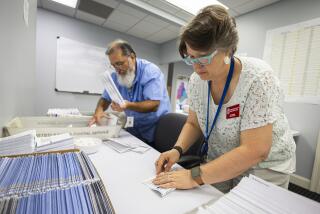Vote Reform Slow to Come
WASHINGTON — When the nation was transfixed by hanging chads and “butterfly ballots” during 36 days of uncertainty over who won the 2000 presidential election, politicians and good-government advocates said the crisis proved the need to reform the country’s voting system.
Exactly a year later, only a handful of states have acted, perhaps because Congress has not voted to provide the states any federal aid to defray the costs.
“Voters who came to the polls this past election day were confronted with a system that was virtually unchanged, despite everything that we have learned in the past about the system’s problems,” said Tracy Warren, senior policy analyst at the Constitution Project, a Washington research group.
The Constitution Project reported this month that only three states--Florida, Georgia and Maryland--have passed significant election reforms. Seven others, including California, have banned or will phase out punch card ballots, the style of voting responsible for most of Florida’s woes last year.
But no automated voting system is error-free, said Lloyd Leonard, chief lobbyist for the League of Women Voters. He said the key to minimizing the number of spoiled ballots is to increase the “customer friendliness” of the voting system. The goal: to reduce to a bare minimum the number of voters who intend to vote for a particular candidate but who inadvertently vote for another or spoil their ballots.
For example, Leonard said, a League of Women Voters survey found that in only 20% of localities nationally did election officials distribute sample ballots last year so voters could familiarize themselves with the choices before election day.
So on Nov. 7, 2000, the survey said, many voters did not know what to expect when they lined up at their polling places. They got little guidance from poll workers, who themselves probably had received only one to three hours of training, it said.
“Given that elections can be won or lost by extremely narrow margins, these levels of performance are not acceptable,” said League of Women Voters President Carolyn Jefferson-Jenkins. “ ‘Good enough’ is not good enough.”
By the league’s count, members of Congress have introduced 54 bills to reform the election process. Only two have a realistic chance of coming to a floor vote. These bills, sponsored by Sen. Christopher J. Dodd (D-Conn.) and Rep. Steny H. Hoyer (D-Md.), would provide federal aid to states that reformed their election procedures.
Hoyer’s bill would reward states that eliminated punch card voting; Dodd’s would set federal voting and technology standards. Hoyer’s remains in committee; the Senate Rules and Administration Committee sent Dodd’s bill to the floor.
Dodd’s bill, rather than mandating that states adopt a particular voting system, would require them to use vote-counting machines with error rates of 1% or less (compared with 12.4% in the worst Florida county last year). No matter what kind of ballot is used, every county’s election system must check the validity of each vote on the spot and give a second chance to voters who spoil their ballots.
States would have to distribute sample ballots and voting instructions before every election. Finally, polling places would have to be accessible to disabled voters--which many, according to the League of Women Voters survey, are not now.
After a year of studying election reform, Leonard and Warren agree that the Florida recount crisis could have happened virtually anywhere.
“I’m just surprised it didn’t happen sooner,” Leonard said.
More to Read
Get the L.A. Times Politics newsletter
Deeply reported insights into legislation, politics and policy from Sacramento, Washington and beyond. In your inbox three times per week.
You may occasionally receive promotional content from the Los Angeles Times.










